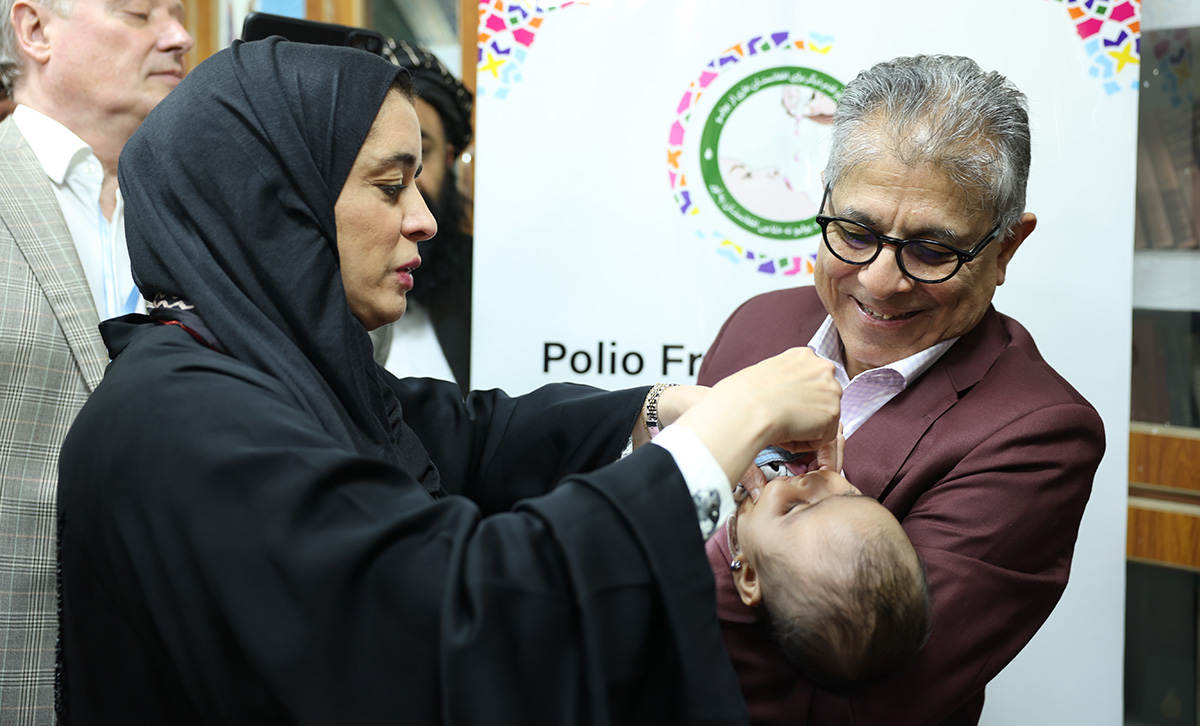
10 May 2024, Kabul, Afghanistan: WHO Regional Director for the Eastern Mediterranean Dr. Hanan Balkhy recently wrapped up a three-day visit to Kabul, Afghanistan, following the completion of her high-level mission with the Chair of the Polio Oversight Board and partners from the Global Polio Eradication Initiative (GPEI) in neighboring Pakistan.
During her time in Afghanistan, Dr. Balkhy met with de facto authorities and health partners in Kabul to discuss critical health issues focusing on promoting equitable access to health care, empowering females and expanding health workforce education, addressing substance abuse, and eradicating polio.
As one of the two countries in which polio remains endemic, Afghanistan has made incremental progress since resumption of campaigns in November 2021. During her visit, Dr. Balkhy, together with Regional Director for South Asia Mr. Sanjay Wijeskera, engaged with partners and stakeholders to underscore WHO and the Global Polio Eradication Initiative’s commitment to closing the remaining gaps for polio eradication in the country and ending polio for good.
With just three cases reported this year and the virus restricted to the country’s East and South Regions, Afghanistan has its best opportunity to eradicate polio. The recent announcement by top leadership to reinstate house-to-house polio vaccination activities in the South Region is a key development that will enable the programme to reach more vulnerable children.
Dr. Balkhy underscored WHO’s commitment to polio eradication in Afghanistan and Pakistan as a key regional public health priority. She reiterated her commitment to convene a Health Dialogue between Afghanistan and Pakistan, a proposal that was embraced by the Government of Pakistan, which will address broader health needs of both countries, including stronger collaboration on polio eradication.
Dr. Balkhy also visited WHO-supported health facilities of Indira Gandhi Children’s Hospital, one of 130 nutrition stabilization centres supported by WHO in Afghanistan, and the Kabul 100-bed Females and Children Drug Addiction Treatment Center (DATC), one of seven rehabilitation centers receiving vital support from WHO and partners. In the ward for addicted children, Dr Balkhy had an emotional encounter with several young girls who told her stories of their struggles and journeys to recovery.
During her visits to the health facilities, Dr Balkhy engaged with patients and healthcare staff, and stressed the critical importance of enhancing the medical staff capacity and improving accessibility to healthcare services for vulnerable populations throughout Afghanistan.
Recognizing that women’s education significantly influences health and the overall well-being of the population, Dr Balkhy reiterated her commitment to advocating for female education and rights as part of overall efforts in advancing Afghanistan’s health agenda.
“WHO has played a fundamental role in polio eradication efforts in Afghanistan, as well as responding to essential, lifesaving needs across the country,” said Dr. Balkhy. “In line with my regional priorities, we will continue to work with the de facto health authorities and our partners to expand equitable access to quality health care, strengthen the capacity of health workforce — especially women — and address substance abuse.”
The humanitarian crisis in Afghanistan is one of the world’s most severe, with some of the highest levels of food insecurity globally. Drought, displacement, and poverty persist, while natural disasters exacerbate the situation. Humanitarian needs have surged, with the number of people in need rising from 18.4 million in mid-2021 to approximately 23.7 million in 2024. Of these, about 17.9 million urgently require health assistance.













